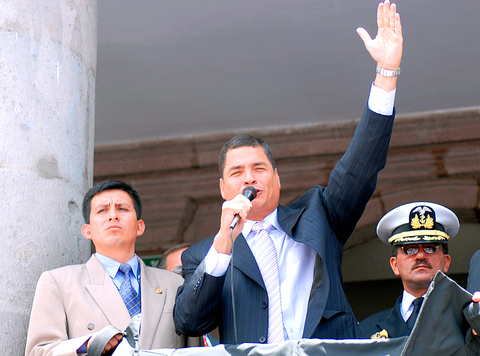Ecuador's political crisis deepened on Friday when the Constitutional Tribunal warned President Rafael Correa that he would be acting illegally if he ignores its eventual ruling on the constitutionality of a national referendum.
Correa said on Thursday night that he would not respect any ruling that opposed the referendum on whether to rewrite the country's constitution -- one of several disputes that have set Ecuador's courts, Congress and president at one another's throats.
The Supreme Electoral Tribunal this week fired 57 congressmen it accused of interfering with the referendum, which the lawmakers have called unconstitutional. The congressmen's interference consisted of calling for the impeachment of a majority of members of the Electoral Tribunal.

PHOTO: AP
The separate Constitutional Tribunal is reviewing the measure's legality, but Correa said the court has no authority in the matter.
Correa supports the referendum and the creation of a special assembly to rewrite the constitution to limit the power of a political class he blames for Ecuador's problems of corruption and political instability. Correa is the country's eighth president in 10 years.
"It is a crime when a citizen disregards a ruling of the Constitutional Tribunal," said Santiago Velasquez, the court's president, on Friday.
Congress, which Correa has called "a sewer of corruption," approved the April 15 referendum last month, but stipulated that the 130-member assembly would not have the power to dismiss lawmakers and other officials elected in last year's elections.
But Correa disregarded the restrictions imposed by Congress, and the Electoral Tribunal approved his request that the assembly have unlimited powers to dismiss any elected official.
The seven-member electoral tribunal voted to oust the 57 congressmen after they signed a petition to start impeachment proceedings against the four court members who voted for Correa's version of the referendum.
On Thursday, dozens of police officers surrounded the congressional building to prevent the 57 lawmakers from entering. The 100-member unicameral body was unable to convene because it needs a quorum of 51.
The Constitutional Tribunal agreed on Thursday to a request from Congress to review the legality of the referendum. Correa responded that the court had no authority to act on the issue.
"The Supreme Election Tribunal is the maximum authority in elections," he said, adding that the Constitutional Tribunal is "dominated by the political parties."
The Constitutional Tribunal's rulings have often been ignored by presidents and Congress in the past.
Correa says his proposed reforms would make elected officials more accountable.
But opposition lawmaker Carlos Larreategui said that Ecuador "is starting to look like a dictatorship."
"The government is also trying to influence the Constitutional Tribunal's decision, which is the last resort to resolve this impasse," he said.
Correa, 43, a US-educated economist who says he wants to bring socialism to Ecuador, ran as a political outsider, earning support from Ecuadoreans fed up with the political establishment.
He is an admirer of Venezuela's firebrand anti-US President Hugo Chavez, who used a constitutional assembly to consolidate his power.

MONEY GRAB: People were rushing to collect bills scattered on the ground after the plane transporting money crashed, which an official said hindered rescue efforts A cargo plane carrying money on Friday crashed near Bolivia’s capital, damaging about a dozen vehicles on highway, scattering bills on the ground and leaving at least 15 people dead and others injured, an official said. Bolivian Minister of Defense Marcelo Salinas said the Hercules C-130 plane was transporting newly printed Bolivian currency when it “landed and veered off the runway” at an airport in El Alto, a city adjacent to La Paz, before ending up in a nearby field. Firefighters managed to put out the flames that engulfed the aircraft. Fire chief Pavel Tovar said at least 15 people died, but

LIKE FATHER, LIKE DAUGHTER: By showing Ju-ae’s ability to handle a weapon, the photos ‘suggest she is indeed receiving training as a successor,’ an academic said North Korea on Saturday released a rare image of leader Kim Jong-un’s teenage daughter firing a rifle at a shooting range, adding to speculation that she is being groomed as his successor. Kim’s daughter, Ju-ae, has long been seen as the next in line to rule the secretive, nuclear-armed state, and took part in a string of recent high-profile outings, including last week’s military parade marking the closing stages of North Korea’s key party congress. Pyongyang’s official Korean Central News Agency (KCNA) released a photo of Ju-ae shooting a rifle at an outdoor shooting range, peering through a rifle scope

South Korea would soon no longer be one of the few countries where Google Maps does not work properly, after its security-conscious government reversed a two-decade stance to approve the export of high-precision map data to overseas servers. The approval was made “on the condition that strict security requirements are met,” the South Korean Ministry of Land, Infrastructure and Transport said. Those conditions include blurring military and other sensitive security-related facilities, as well as restricting longitude and latitude coordinates for South Korean territory on products such as Google Maps and Google Earth, it said. The decision is expected to hurt Naver and Kakao

India and Canada yesterday reached a string of agreements, including on critical mineral cooperation and a “landmark” uranium supply deal for nuclear power, the countries’ leaders said in New Delhi. The pacts, which also covered technology and promoting the use of renewable energy, were announced after Indian Prime Minister Narendra Modi and Canadian Prime Minister Mark Carney hailed a fresh start in the relationship between their nations. “Our ties have seen a new energy, mutual trust and positivity,” Modi said. Carney’s visit is a key step forward in ties that effectively collapsed in 2023 after Ottawa accused New Delhi